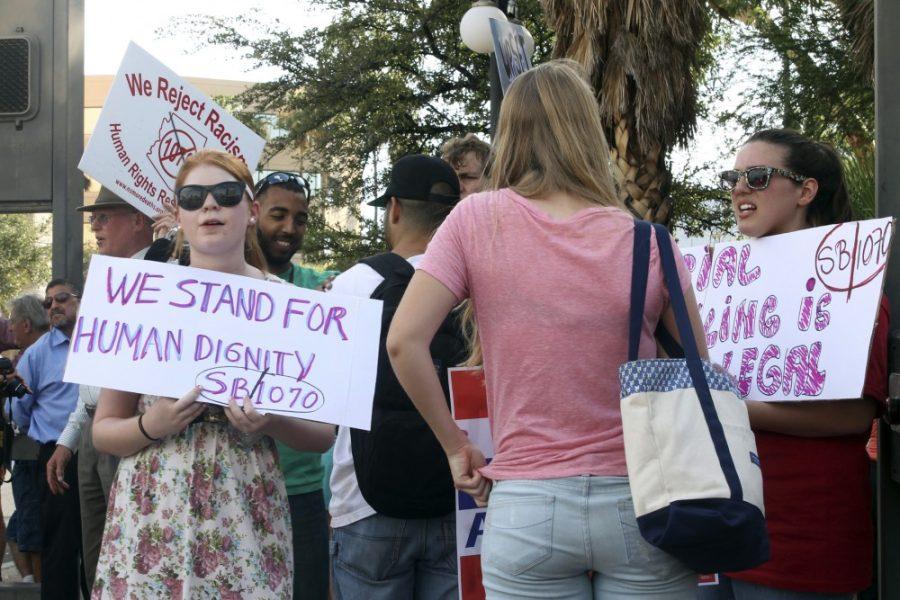WASHINGTON — The Supreme Court on Monday upheld part of Arizona’s strict border-control law, which compels the state’s law enforcement officers to check the residency status of people they suspect are in the country illegally. In a complex decision that’s likely to spur similar crackdowns in other states, the court struck down some of Arizona’s law while saying it was too soon to say whether the most controversial status checks go too far.
“The nature and timing of this case counsel caution in evaluating the validity” of the law, Justice Anthony Kennedy wrote for the majority, adding that “at this stage, there is a basic uncertainty about what the law means and how it will be enforced.”
Despite the law’s uncertainty, the court let it pass likely because it needed to be enforced for some time before being accurately judged, according to Tiana O’Konek, a lawyer in the UA’s Immigration Law Clinic.
“It seems like the court’s basically saying, ‘Once this show-me-your-papers provision is enforced, come back to us and we’ll determine if there were civil rights violations,’” O’Konek said. “From a practical standpoint, it seems pretty hard to imagine how that particular provision … could ever be enforced without violating civil rights. I think we’ll probably see a lot of future litigation once it’s actually enforced and implemented.”
The law requires Arizona law enforcement personnel who’ve detained individuals for other legitimate reasons to check their residency status if the officers have a “reasonable suspicion” that the detainees are illegal immigrants. When someone is arrested, residency status must be confirmed before the person is released.
This section can now go into effect, after which other legal challenges can be filed.
Even with the new requirements, the University of Arizona Police Department will not likely see much of a change in terms of how they serve the campus, according to Sgt. Juan Alvarez, the department’s public information officer.
“We feel that it’s not going to impact us greatly, but we’re going to comply with the law,” Alvarez said. “We are committed to safeguarding the community and keeping people safe, but obviously we are tasked with enforcing the law, so we will do that.”
The Arizona Support Our Law Enforcement and Safe Neighborhoods Act also makes it a state crime to be in the U.S. without
authorization, as well as a state crime for an illegal immigrant to work or seek work without authorization. The Supreme Court struck down these provisions as intrusions on federal authority.
“Arizona may have understandable frustrations with the problems caused by illegal immigration,” Kennedy acknowledged, “but the state may not pursue policies that undermine federal law.”
Five justices agreed, three justices disagreed in whole or in part and one justice did not participate.
“The issue here is a stark one,” Justice Antonin Scalia wrote in dissent. “Are the sovereign states at the mercy of the federal executive’s refusal to enforce the nation’s immigration laws?”
Citing congressional failures to deal effectively with immigration, as well as the estimated 11 million illegal immigrants who live in the United States, Arizona legislators included several far-reaching provisions in the 2010 law.
But of the two issues — whether the law encouraged racial profiling or whether the federal government was refusing to let states enforce their immigration laws — some said civil rights are more significant in this case.
“I think its great that the court came down on the Obama Administration’s side for three of the four provisions, basically saying, ‘Yeah, these were clearly preempted by federal law,’” O’Konek added. “…But I think this law both invites racial profiling and is likely to spawn a lot of it.”
Local activists have also expressed distaste for the bill’s ruling, some saying that they weren’t surprised by the court’s decision.
“Back in April when the hearings began, it was pretty clear that the Supreme Court would uphold the most egregious portions of the law, which they did,” said Gabriel Schivone, a founder of the UA club No Más Muertes/No More Deaths and a former Daily Wildcat columnist. “There is a commonality of essentially racial profiling or racism that forms the core of the law and that forms the core of the Supreme Court legitimizing this sort of forcing cops or anyone to check papers under reasonable suspicion.”
The Obama administration sued to block the law even before it took effect, arguing that the state was intruding on the federal government’s authority to secure borders and set immigration policy. The 9th U.S. Circuit Court of Appeals had sided with Obama and struck down the law. The circuit, covers nine Western states, is the nation’s largest and in many years it’s the most frequent to be reversed by the Supreme Court.
“Fear,” Gary Segura, a Stanford University pollster and political science professor, said earlier this year, “is a remarkable mobilizer.”
Democratic Sen. Charles Schumer of New York already has promised to introduce a bill rebutting the court. The measure has no chance of passing this year through a divided Congress, but it could sharpen a debate that Democratic strategists such as Schumer think can help them among Hispanic voters.
In another move alluring to Hispanic voters, Obama used his presidential authority earlier this month to protect hundreds of thousands of young illegal immigrants from potential deportation. Obama’s executive order is expected to cover immigrants younger than 30 who had entered the United States before they were 16.
Justice Elena Kagan didn’t participate in the case, the last one to be argued during the term that began last October, as her former colleagues in the Office of the Solicitor General had tried to block Arizona’s law.
—Kyle Mittan contributed reporting from Tucson









